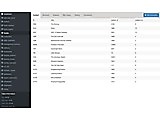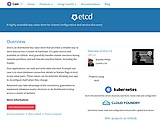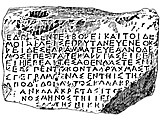 Most drones (UAVs) cannot look straight up to photograph the sky above them. As a result, spherical panoramas made with drones tend to have a gap in the sky. Some drones, like the DJI Mavic 2, can fill in this gap automatically while generating a preview. Skyfill allows you to do fill in those gaps in the sky in high-resolution images.
Most drones (UAVs) cannot look straight up to photograph the sky above them. As a result, spherical panoramas made with drones tend to have a gap in the sky. Some drones, like the DJI Mavic 2, can fill in this gap automatically while generating a preview. Skyfill allows you to do fill in those gaps in the sky in high-resolution images.
 Forgejo is a self-hosted lightweight software forge. Easy to install and low maintenance, it just does the job. Brought to you by an inclusive community under the umbrella of Codeberg e.V., a democratic non-profit organization, Forgejo can be trusted to be exclusively Free Software. You can create an account on Codeberg and other instances or download it to self-host your own. It focuses on security, scaling, federation and privacy. Learn more about how it compares with other forges.
Forgejo is a self-hosted lightweight software forge. Easy to install and low maintenance, it just does the job. Brought to you by an inclusive community under the umbrella of Codeberg e.V., a democratic non-profit organization, Forgejo can be trusted to be exclusively Free Software. You can create an account on Codeberg and other instances or download it to self-host your own. It focuses on security, scaling, federation and privacy. Learn more about how it compares with other forges.
 Check out our open-source, language-agnostic mutation testing tool using LLM agents here: https://github.com/codeintegrity-ai/mutahunter Mutation testing is a way to verify the effectiveness of your test cases. It involves creating small changes, or “mutants,” in the code and checking if the test cases can catch these changes. Unlike line coverage, which only tells you how much of the code has been executed, mutation testing tells you how well it’s been tested. We all know line coverage is BS.
Check out our open-source, language-agnostic mutation testing tool using LLM agents here: https://github.com/codeintegrity-ai/mutahunter Mutation testing is a way to verify the effectiveness of your test cases. It involves creating small changes, or “mutants,” in the code and checking if the test cases can catch these changes. Unlike line coverage, which only tells you how much of the code has been executed, mutation testing tells you how well it’s been tested. We all know line coverage is BS.
 GoRules is a cross-platform, Open-Source Business Rules Engine (BRE). It is written in Rust and provides native bindings for NodeJS, Python and Go. ZEN Engine allows to load and execute JSON Decision Model (JDM) from JSON files.
GoRules is a cross-platform, Open-Source Business Rules Engine (BRE). It is written in Rust and provides native bindings for NodeJS, Python and Go. ZEN Engine allows to load and execute JSON Decision Model (JDM) from JSON files.
 Navidrome is an open source web-based music collection server and streamer. It gives you freedom to listen to your music collection from any browser or mobile device. It's like your personal Spotify! Features Handles very large music collections Streams virtually any audio format available Reads and uses all your beautifully curated metadata Great support for compilations (Various Artists albums) and box sets (multi-disc albums) Multi-user, each user has their own play coun
Navidrome is an open source web-based music collection server and streamer. It gives you freedom to listen to your music collection from any browser or mobile device. It's like your personal Spotify! Features Handles very large music collections Streams virtually any audio format available Reads and uses all your beautifully curated metadata Great support for compilations (Various Artists albums) and box sets (multi-disc albums) Multi-user, each user has their own play coun
 aerc is an email client that runs in your terminal. It's highly efficient and extensible, perfect for the discerning hacker. Check out the screencast above to get an idea of how it's used. Some of its more interesting features include: Editing emails in an embedded terminal tmux-style, allowing you to check on incoming emails and reference other threads while you compose your replies Render HTML emails with an interactive terminal web browser, highlight patches with diffs, and browse w
aerc is an email client that runs in your terminal. It's highly efficient and extensible, perfect for the discerning hacker. Check out the screencast above to get an idea of how it's used. Some of its more interesting features include: Editing emails in an embedded terminal tmux-style, allowing you to check on incoming emails and reference other threads while you compose your replies Render HTML emails with an interactive terminal web browser, highlight patches with diffs, and browse w
 Syncthing is a continuous file synchronization program. It synchronizes files between two or more computers. We strive to fulfill the goals below. The goals are listed in order of importance, the most important ones first. Syncthing should be: Safe From Data Loss Protecting the user's data is paramount. We take every reasonable precaution to avoid corrupting the user's files. Secure Against Attackers Again, protecting the user's data is paramount. Regardless of our other goa
Syncthing is a continuous file synchronization program. It synchronizes files between two or more computers. We strive to fulfill the goals below. The goals are listed in order of importance, the most important ones first. Syncthing should be: Safe From Data Loss Protecting the user's data is paramount. We take every reasonable precaution to avoid corrupting the user's files. Secure Against Attackers Again, protecting the user's data is paramount. Regardless of our other goa
 Gitea is a painless self-hosted Git service. It is similar to GitHub, Bitbucket, and GitLab. Gitea is a fork of Gogs. See the Gitea Announcement blog post to read about the justification for a fork. Purpose The goal of this project is to provide the easiest, fastest, and most painless way of setting up a self-hosted Git service. With Go, this can be done with an independent binary distribution across all platforms and architectures that Go supports. This support includes Linux, macOS, and Windo
Gitea is a painless self-hosted Git service. It is similar to GitHub, Bitbucket, and GitLab. Gitea is a fork of Gogs. See the Gitea Announcement blog post to read about the justification for a fork. Purpose The goal of this project is to provide the easiest, fastest, and most painless way of setting up a self-hosted Git service. With Go, this can be done with an independent binary distribution across all platforms and architectures that Go supports. This support includes Linux, macOS, and Windo
 A simple terminal UI for git commands, written in Go with the gocui library.
A simple terminal UI for git commands, written in Go with the gocui library.
 The open source infrastructure as code tool. Previously named OpenTF, OpenTofu is a fork of Terraform that is open-source, community-driven, and managed by the Linux Foundation. OpenTofu is an OSS tool for building, changing, and versioning infrastructure safely and efficiently. OpenTofu can manage existing and popular service providers as well as custom in-house solutions. The key features of OpenTofu are: Infrastructure as Code: Infrastructure is described using a high-level configurat
The open source infrastructure as code tool. Previously named OpenTF, OpenTofu is a fork of Terraform that is open-source, community-driven, and managed by the Linux Foundation. OpenTofu is an OSS tool for building, changing, and versioning infrastructure safely and efficiently. OpenTofu can manage existing and popular service providers as well as custom in-house solutions. The key features of OpenTofu are: Infrastructure as Code: Infrastructure is described using a high-level configurat
 Stay in control of your email and keep email decentralized! Complete email solution For sending and receiving email. With support for IMAP4, SMTP, SPF, DKIM, DMARC, MTA-STS, DANE and DNSSEC, reputation-based and content-based junk filtering, Internationalization (IDNA), automatic TLS with ACME and Let's Encrypt, account autoconfiguration, webmail. Quick & easy Use the quickstart command to set up mox for your domain(s) within 10 minutes. You'll get a secure mail server with a modern protocol s
Stay in control of your email and keep email decentralized! Complete email solution For sending and receiving email. With support for IMAP4, SMTP, SPF, DKIM, DMARC, MTA-STS, DANE and DNSSEC, reputation-based and content-based junk filtering, Internationalization (IDNA), automatic TLS with ACME and Let's Encrypt, account autoconfiguration, webmail. Quick & easy Use the quickstart command to set up mox for your domain(s) within 10 minutes. You'll get a secure mail server with a modern protocol s
 As consultants, you may need to use multiple calendars (2-n). Additionally, you need to keep up with all existing appointments in each of your calendars when you want to make new appointments. This means you have to check each calendar on its own. What we wanted to achieve is a single overview over all events in each of the calendars. Preferably in your primary calendar. There are some commercial / freemium solutions for this (reclaim.ai, SyncThemCalendars), but their privacy policy is unclear.
As consultants, you may need to use multiple calendars (2-n). Additionally, you need to keep up with all existing appointments in each of your calendars when you want to make new appointments. This means you have to check each calendar on its own. What we wanted to achieve is a single overview over all events in each of the calendars. Preferably in your primary calendar. There are some commercial / freemium solutions for this (reclaim.ai, SyncThemCalendars), but their privacy policy is unclear.
 SigLens is a cutting-edge, purpose-built solution designed to efficiently manage massive volumes of data ranging from terabytes to petabytes, all while optimizing resource utilization. Functioning as a column-oriented database, SigLens incorporates dynamic columnar compressions to achieve an impressive 90% compression across diverse data types, spanning from low to high cardinality datasets. One of SigLens' groundbreaking features is its micro indexing technology, a revolutionary advancement th
SigLens is a cutting-edge, purpose-built solution designed to efficiently manage massive volumes of data ranging from terabytes to petabytes, all while optimizing resource utilization. Functioning as a column-oriented database, SigLens incorporates dynamic columnar compressions to achieve an impressive 90% compression across diverse data types, spanning from low to high cardinality datasets. One of SigLens' groundbreaking features is its micro indexing technology, a revolutionary advancement th
 It is a framework for building applications based on components. They can be used in several applications and can be interchangeable. This is only needed to initialize the application. It does NOT affect the main loop of your application. Components may depend on other components. They can be expanded or reduced depending on your requirements. Components are not microservices. These are folders that contain different functionality. We provide the ability to use dependency injecting, configurat
It is a framework for building applications based on components. They can be used in several applications and can be interchangeable. This is only needed to initialize the application. It does NOT affect the main loop of your application. Components may depend on other components. They can be expanded or reduced depending on your requirements. Components are not microservices. These are folders that contain different functionality. We provide the ability to use dependency injecting, configurat
 What is the 3MF Consortium The 3MF Consortium is an industry association formed to develop and promote a new full-fidelity file format for 3D printing/additive manufacturing, known as the 3D Manufacturing Format (3MF). This consortium came together to rectify the limitations of the existing file formats used in 3D printing, providing a standardized, more capable format that could handle the full range of additive manufacturing technologies from prototyping to production. What is .3mf ? The 3D
What is the 3MF Consortium The 3MF Consortium is an industry association formed to develop and promote a new full-fidelity file format for 3D printing/additive manufacturing, known as the 3D Manufacturing Format (3MF). This consortium came together to rectify the limitations of the existing file formats used in 3D printing, providing a standardized, more capable format that could handle the full range of additive manufacturing technologies from prototyping to production. What is .3mf ? The 3D
 pgweb is a web-frontend in Go to browse PostgreSQL 9.x databases. It easily connects to a running local or remote server, shows tables and rows, can detail the table and column type attributes, run SQL queries, and export results to CSV. It's cross-platform and easily started from the console and then be accessed per browser.
pgweb is a web-frontend in Go to browse PostgreSQL 9.x databases. It easily connects to a running local or remote server, shows tables and rows, can detail the table and column type attributes, run SQL queries, and export results to CSV. It's cross-platform and easily started from the console and then be accessed per browser.
 This tool provides a basic, RFC-compliant LDAP server to serve locally-defined user and groups (i.e. in /etc/passwd and /etc/group). By using directoryd, one can turn a vanilla UNIX/Linux server into a central identity repository for other UNIX/Linux servers, macOS machines, ownCloud/Nextcloud, Gitea, Zabbix, nearly any LDAP-aware solution...
This tool provides a basic, RFC-compliant LDAP server to serve locally-defined user and groups (i.e. in /etc/passwd and /etc/group). By using directoryd, one can turn a vanilla UNIX/Linux server into a central identity repository for other UNIX/Linux servers, macOS machines, ownCloud/Nextcloud, Gitea, Zabbix, nearly any LDAP-aware solution...
 Simple styled logger in Go with no dependencies.
Simple styled logger in Go with no dependencies.
 Micro is a terminal-based text editor that aims to be easy to use and intuitive, while also taking advantage of the full capabilities of modern terminals. It comes as one single, batteries-included, static binary with no dependencies, and you can download and use it right now. As the name indicates, micro aims to be somewhat of a successor to the nano editor by being easy to install and use in a pinch, but micro also aims to be enjoyable to use full time, whether you work in the terminal becaus
Micro is a terminal-based text editor that aims to be easy to use and intuitive, while also taking advantage of the full capabilities of modern terminals. It comes as one single, batteries-included, static binary with no dependencies, and you can download and use it right now. As the name indicates, micro aims to be somewhat of a successor to the nano editor by being easy to install and use in a pinch, but micro also aims to be enjoyable to use full time, whether you work in the terminal becaus
 sievemgr is a command-line client for managing Sieve scripts on remote servers via the ManageSieve Protocol (RFC 5804). Given valid credentials, sievemgr can be invoked non-interactively in order to retrieve a list of all scripts, retrieve the scripts themselves, publish scripts on the a server, or delete them. Furthermore, it can be used to change the active script and to display information about the server.
sievemgr is a command-line client for managing Sieve scripts on remote servers via the ManageSieve Protocol (RFC 5804). Given valid credentials, sievemgr can be invoked non-interactively in order to retrieve a list of all scripts, retrieve the scripts themselves, publish scripts on the a server, or delete them. Furthermore, it can be used to change the active script and to display information about the server.
 The mnm project is building a legitimate email replacement: a client, a server, and a simple protocol (TMTP) between them. mnm has two major goals: (a) to provide a far safer correspondence model, and (b) to offer capabilities missing in traditional email.
The mnm project is building a legitimate email replacement: a client, a server, and a simple protocol (TMTP) between them. mnm has two major goals: (a) to provide a far safer correspondence model, and (b) to offer capabilities missing in traditional email.
 The mnm project is building a legitimate email replacement: a client, a server, and a simple protocol between them. mnm has two major goals: (a) to provide a far safer correspondence model, and (b) to offer capabilities missing in traditional email.
The mnm project is building a legitimate email replacement: a client, a server, and a simple protocol between them. mnm has two major goals: (a) to provide a far safer correspondence model, and (b) to offer capabilities missing in traditional email.
 mkcert is a simple tool for making locally-trusted development certificates. It requires no configuration. It auto installs them for Apache, the system certificate and Firefox store to ease testing on https://localhost setups. Additonally supports MacOS and Windows environments.
mkcert is a simple tool for making locally-trusted development certificates. It requires no configuration. It auto installs them for Apache, the system certificate and Firefox store to ease testing on https://localhost setups. Additonally supports MacOS and Windows environments.
 etcd is a distributed key-value store, used as shared cluster configuration backend. It automatically elects a master server, allows dynamic config data with optional TTLs, provides a JSON API over HTTP with TLS and long polling, uses the Raft protocol for distribution. It's the basis for CoreOS, integrates with fleet/systemd, and thus also provides service discovery.
etcd is a distributed key-value store, used as shared cluster configuration backend. It automatically elects a master server, allows dynamic config data with optional TTLs, provides a JSON API over HTTP with TLS and long polling, uses the Raft protocol for distribution. It's the basis for CoreOS, integrates with fleet/systemd, and thus also provides service discovery.
 Sets or replaces the "go_package" option in all protobuf files of a directory, according to a user-specified template. Helps with keeping Go bindings for gRPC services consistent with Go's module semantics.
Sets or replaces the "go_package" option in all protobuf files of a directory, according to a user-specified template. Helps with keeping Go bindings for gRPC services consistent with Go's module semantics.
 BitWrk is a peer-to-peer computation service that tightly integrates into Blender, the 3D rendering software. BitWrk greatly accelerates rendering by scaling to a swarm of computers. Fueled by Bitcoin, BitWrk creates an open marketplace where participants buy or sell computing power like stocks in a stock exchange.
BitWrk is a peer-to-peer computation service that tightly integrates into Blender, the 3D rendering software. BitWrk greatly accelerates rendering by scaling to a swarm of computers. Fueled by Bitcoin, BitWrk creates an open marketplace where participants buy or sell computing power like stocks in a stock exchange.
 Simple process manager written in Go-lang
Simple process manager written in Go-lang
 FVL, or Fourier Video Loop, is a command-line utility to seamlessly loop frame sequence (enumerated .png images) by cutting spectrum of per-pixel transformation over time. More precisely, the time series of each pixel channel, considered as a signal, is approximated by the partial sum of its Fourier series. Using Fast Fourier Transform to switch between the signal and its spectrum, we nullify or reduce some frequencies to decrease the leap of the signal at the ends of the time interval.
FVL, or Fourier Video Loop, is a command-line utility to seamlessly loop frame sequence (enumerated .png images) by cutting spectrum of per-pixel transformation over time. More precisely, the time series of each pixel channel, considered as a signal, is approximated by the partial sum of its Fourier series. Using Fast Fourier Transform to switch between the signal and its spectrum, we nullify or reduce some frequencies to decrease the leap of the signal at the ends of the time interval.
 Package csvplus extends the standard Go encoding/csv package with fluent interface, lazy stream operations, indices and joins.
Package csvplus extends the standard Go encoding/csv package with fluent interface, lazy stream operations, indices and joins.
 Quesfera is a cross-platform framework/engine to make point & click adventures, or quests, with 3D panoramic freelook (similar to Myst III Exile or Scratches). Written in Go and uses SDL2. Demo 'game' and GUI configurator are provided. Includes inventory management, item usage, reading descriptions and books, dialogues with branches, menu, saving & loading, intro, credits, has built-in localization support for texts and voices.
Quesfera is a cross-platform framework/engine to make point & click adventures, or quests, with 3D panoramic freelook (similar to Myst III Exile or Scratches). Written in Go and uses SDL2. Demo 'game' and GUI configurator are provided. Includes inventory management, item usage, reading descriptions and books, dialogues with branches, menu, saving & loading, intro, credits, has built-in localization support for texts and voices.
 roadie is a easy way to run your programs on Google Cloud Platform. It helps you to upload your source codes to the cloud, create and delete instances, and manage outputs.
roadie is a easy way to run your programs on Google Cloud Platform. It helps you to upload your source codes to the cloud, create and delete instances, and manage outputs.
 Naamari is AES&SHA-based crypto-synchronizer for cloud/remote file storage, with cryptographic and transport modules being separate applications. It works with 4 locations. 1st: local dir with original files. 2nd: dir containing folder structure and names of files placed into storage (but not content). 3rd & 4th - storages: local (another local dir) and remote (say, a cloud). In storages, there are no folders, files have pseudo-random names and encrypted content ("flattening"). The main module
Naamari is AES&SHA-based crypto-synchronizer for cloud/remote file storage, with cryptographic and transport modules being separate applications. It works with 4 locations. 1st: local dir with original files. 2nd: dir containing folder structure and names of files placed into storage (but not content). 3rd & 4th - storages: local (another local dir) and remote (say, a cloud). In storages, there are no folders, files have pseudo-random names and encrypted content ("flattening"). The main module
 This software provides both a GO library implementing a Secret Sharing scheme and a command line tool which distributes and reconstructs your secret files.
This software provides both a GO library implementing a Secret Sharing scheme and a command line tool which distributes and reconstructs your secret files.
 top-like cli interface for container monitoring
top-like cli interface for container monitoring
 go-ocr is a tool for extracting plain text from scanned documents in pdf or djvu formats, and postprocessing of the text using user-defined rewriting rules to remove OCR artefacts and irregularities.
go-ocr is a tool for extracting plain text from scanned documents in pdf or djvu formats, and postprocessing of the text using user-defined rewriting rules to remove OCR artefacts and irregularities.
 OCRPDF is a tool for extracting plain text from scanned documents and postprocessing of the text using user-defined rewriting rules to remove OCR artefacts and irregularities.
OCRPDF is a tool for extracting plain text from scanned documents and postprocessing of the text using user-defined rewriting rules to remove OCR artefacts and irregularities.
 Pukcab is a lightweight, single-binary backup system that stores de-duplicated, compressed and incremental backups on a remote server using just an SSH connection.
Pukcab is a lightweight, single-binary backup system that stores de-duplicated, compressed and incremental backups on a remote server using just an SSH connection.
 GoLang is an expressive and statically-typed language with a C-style syntax optimized for conciseness. Garbage collection and code concurrency are core features. It provides strong type safety, but retains a few dynamic capabilities, declaration inference, and built-ins for variable-length arrays and dictionaries. By omitting complex inheritance schemes, operator overleading and generic programming it allows for fast compilation, and defaults to statically linked binaries (utilizing its custom p
GoLang is an expressive and statically-typed language with a C-style syntax optimized for conciseness. Garbage collection and code concurrency are core features. It provides strong type safety, but retains a few dynamic capabilities, declaration inference, and built-ins for variable-length arrays and dictionaries. By omitting complex inheritance schemes, operator overleading and generic programming it allows for fast compilation, and defaults to statically linked binaries (utilizing its custom p
|